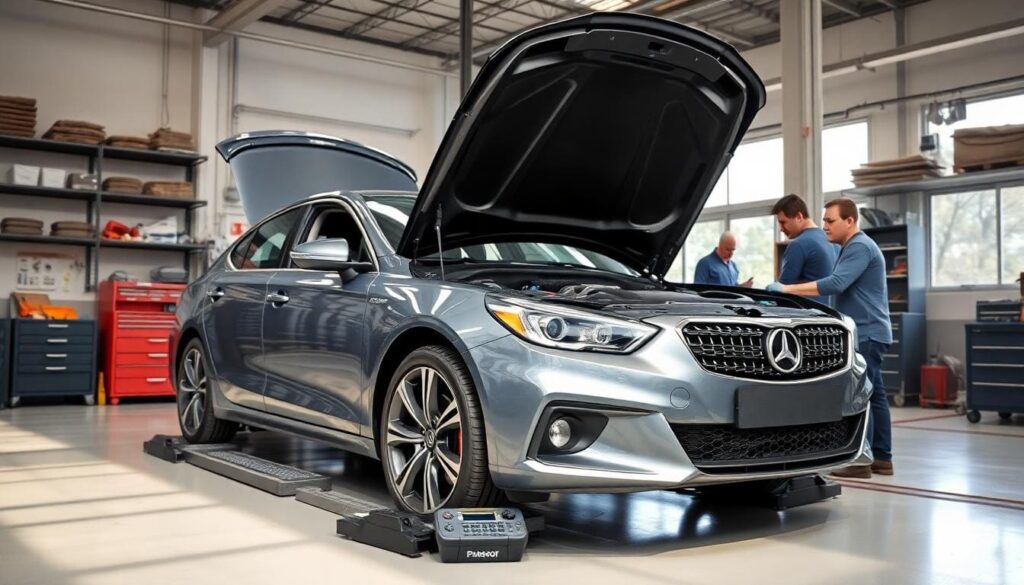Engine coolant additives are often overlooked in vehicle maintenance but play a critical role in enhancing engine efficiency, longevity, and performance. This guide offers an authoritative, unbiased perspective on their functions, benefits, and the factors to consider when choosing between leading brands.
Beyond Water: The Science of Coolant Additives
While water is highly effective at transferring heat, relying on it alone as a coolant introduces significant risks to your engine system:
- Corrosion Threats:
- Water is inherently corrosive to metal components such as radiators and cylinder heads.
- It deposits minerals that lead to scale buildup, clogging essential systems like the heater core and reducing efficiency.
- Extreme Temperature Limitations:
- Water freezes at 32°F (0°C) and boils at 212°F (100°C,) making it unsuitable in cold winters or intense heat.
- Without additives, engines are vulnerable to block cracking in freezing conditions and overheating in summer.
Technical Insight: Coolant additives include corrosion inhibitors, antifreeze compounds, and thermal enhancers designed to overcome water’s limitations, offering year-round protection.
Understanding How Coolant Additives Work
- Temperature Management:
- Additives lower freezing points to protect against crystallization and raise boiling points to prevent vaporization during high-performance operations.
- This ensures reliable cooling even in extreme climates, reducing the risk of catastrophic engine failure.
- Corrosion Resistance:
- By neutralizing chemical reactions that lead to rust and mineral deposits, additives protect the integrity of engine components.
- Particularly vital for aluminum-based engines, which suffer from rapid oxidation without proper inhibitors.
- Compatibility and Specialization:
- Additives are formulated for specific engine types (e.g., gasoline vs. diesel) and tailored to manufacturer recommendations for optimal performance and warranty protection.
For a more detailed breakdown of heavy-duty coolant options, including their unique properties and applications, consult Engine Builder Magazine’s in-depth guide. This trusted source provides additional insights into the diversity of coolant formulations and their impact on engine performance.

Performance Comparisons: AMSOIL and Leading Brands
Choosing a high-performance coolant involves understanding the strengths of different options. Here’s a balanced comparison of reputed brands:
- AMSOIL Passenger Car & Light Truck Antifreeze & Coolant:
- AMSOIL offers a universal ethylene glycol-based coolant designed for protection against freezing, boiling, and corrosion.
- Engineered to meet the needs of modern gasoline and diesel engines, it includes organic acid technology (OAT) to minimize wear and maximize longevity.
- Mobil 1 Extended Performance Coolant:
- Focused on durability, this coolant incorporates proven corrosion inhibitors to extend service life and reduce the cost of maintenance.
- Its extended drain intervals make it a strong choice for drivers seeking long-term reliability.
- Valvoline Zerex American Vehicle Antifreeze & Coolant:
- Designed specifically to meet the requirements of American-made vehicles, this coolant provides robust protection against corrosion and extreme temperatures.
- Compatible with a wide range of vehicles, it also adheres to performance standards set by leading manufacturers.
Unbiased Conclusion: Each product has unique benefits tailored to specific users. AMSOIL excels in modern engines with organic additive technology, Mobil 1 prioritizes long life and durability, and Valvoline Zerex focuses on American vehicle compatibility.
Making the Right Choice: A Practical Guide
Step 1: Evaluate Your Environment.
- For extreme cold: Look for antifreeze properties and freezing point depressants.
- For high heat: Prioritize additives with robust thermal stability.
Step 2: Align with Manufacturer Guidelines.
- Use only additives compatible with your engine to avoid warranty issues or subpar results.
Step 3: Prioritize Long-Term Protection Over Cost.
- Premium products may come at a higher price but often save significant repair costs by ensuring long-term reliability.

Frequently Asked Questions (FAQs)
Q1: Do I need coolant additives if I already use a premixed coolant?
Modern coolants often come pre-mixed with additives. However, higher-performance additives may provide additional benefits, especially in extreme driving conditions.
Q2: Can I mix different coolant types?
Mixing different formulations can cause chemical incompatibility, leading to reduced performance or system damage. Stick to a single, recommended type.
Q3: How do additives prevent engine damage?
They include inhibitors that combat rust, scale, and thermal degradation. This protection minimizes wear and prolongs engine life.
Q4: What is the advantage of synthetic formulations?
Synthetic coolants, such as those offered by AMSOIL, use high-purity components that enhance thermal stability and reduce wear under demanding conditions.
Key Takeaways
- Neutral Expertise: Coolant additives address real-world challenges like corrosion, freezing, and overheating with proven science and measurable results.
- Balanced Comparisons: Leading brands such as AMSOIL, Mobil 1, and Valvoline Zerex offer unique advantages tailored to specific needs.
- Informed Decisions: Understanding your vehicle’s requirements and operating conditions is crucial to selecting the right coolant additive.
Final Thoughts
Coolant additives are a pillar of effective engine maintenance, providing critical protections that water alone cannot deliver. By taking a balanced, data-driven approach to selecting additives, you ensure not only the durability of your engine but also its consistent performance under variable conditions. Trusting credible brands while maintaining compatibility with your vehicle’s specifications ensures reliability, safety, and peace of mind on the road.
